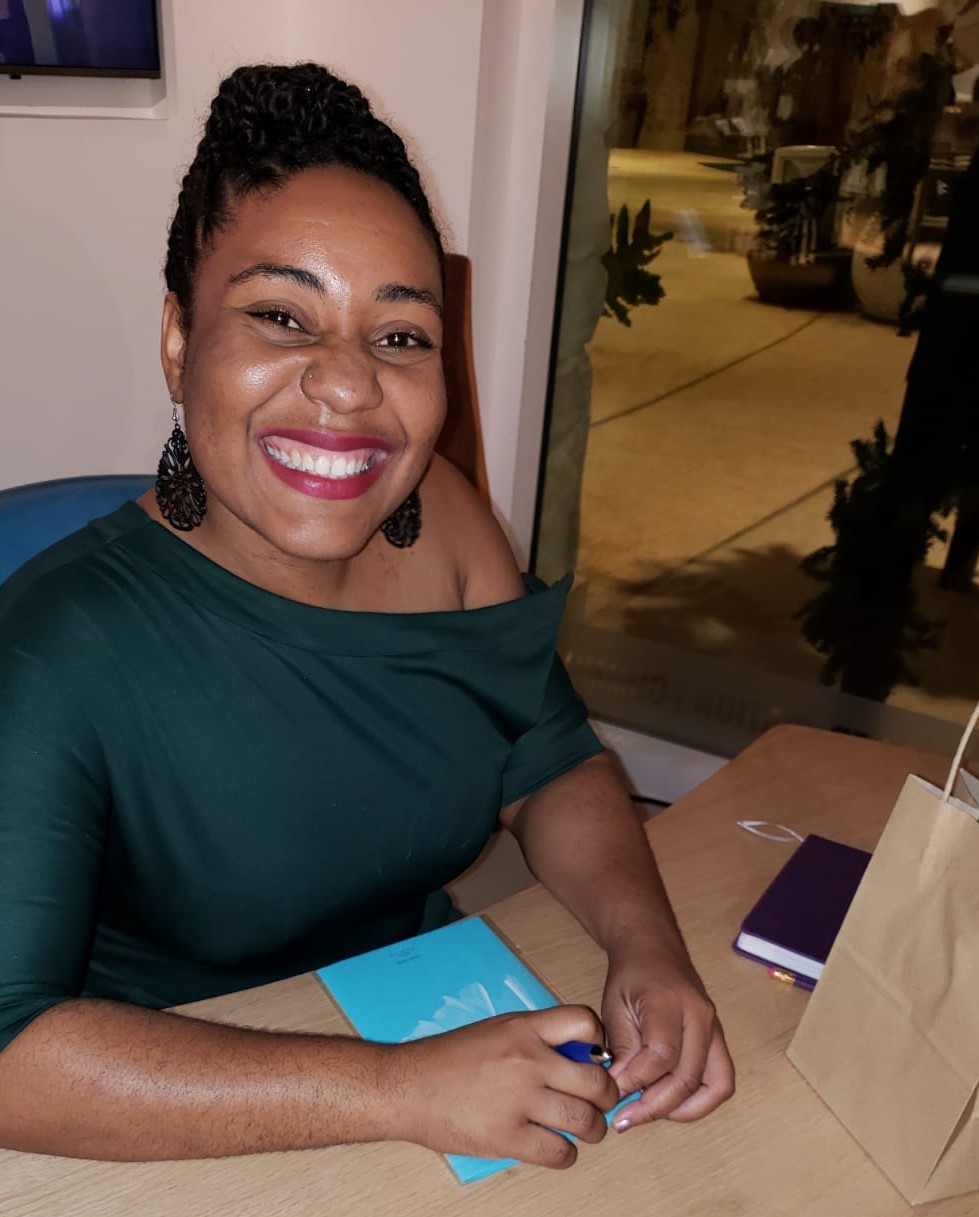
Konya Shamsrumi: What is the process of writing a poem like for you? Is it a lot of hard work or easy?
Yasmin Glinton: The content of the poem usually determines if it’s hard or easy work. The more detached I am from the content, the easier it is for me to write the poem. And those poems often come to me in their entirety. I sit for a session and the words rush to me as if they were only waiting for me to sit and invite them to the page. Then they ask to live in their own space across the page. And that can be fun work. Trying to figure out where each word wants to live on the black space.
Other times writing a poem is hard work.
The delivery of content really makes the poem work me. It the process of questioning myself about a subject that makes poetry hard. The poem exists as a record of my voice about a particular situation I’ve seen, something I’ve read, conversations I’ve heard and other people’s experiences. And, I never want to rush those things.
In my writing process, those poems exist in a place of continual and consistent editing and trying to figure out the correct word, the politics behind the word, and my audience. I’m in a writing group and one of the ladies taught me about delving into the history of a word. This idea complicates my process because now it’s a constant shuffle for the right word. That’s just the internal phase of my process. After that, my writing goes to my writing group because sometimes I’m content but I still feel like I’m missing something. The first set of eyes that see a poem after I’ve written it are important to me. These people know my voice and they help me to fine tune what I’m saying, which really helps.
Another reason I think I’d say writing a poem is hard work is because my poems live in the edits. There is always some room for them to change and to grow and perhaps that’s also a part of what makes them work. I revisit them because they reveal the history of who I was and what I thought. And, as I change in some instances so must they. If not the particular poem then the content—the delivery. I think my work is always in conversation with me asking if what I’ve written is the true representation of how I see the world, how I remember a moment. And, sometimes they stand for years with no edits. Other times they cannot.
Konya Shamsrumi: Please describe your sense of identity in this or any possible world in imagery or metaphor?
Yasmin Glinton: My identity is a treasure chest. I go out into the world and gather experiences and put them in the chest and they exist in parts. There is nothing concrete there, just parts. Some of what is in the chest lose their value and are replaced by other things, are buried by other things. Some are well worn and constantly admired.
But, I can never say I am one of the things I have collected because there are so many things I have not tried to be. There are so many things that I have not yet questioned about myself because I have had no reason to. So, I do not know that I can say what I am. I know I have passed through things I can not be, in very particular instances, and things I am with meticulous resolve.
Konya Shamsrumi: If any of your poems could literarily save a person’s life, which poem would it be and can you describe the person whose life you think it would have saved?
Yasmin Glinton: Now I’m looking at all my poems like which one of you are lifesaving? Stand up. Come to the front. LOL! No one has come forward. So perhaps they do not think of themselves as lifesaving. That is a good thing. The idea of my work saving a person’s life seems very overwhelming. I hope to touch a life. The act of having to save a life I think is an emotional responsibility—a weight I am not willing to take on.
If I was to say which poem, I
think, touched people then I would say Dear
Student.
I wrote this poem to my students and I read it to my students every new school
year. I like to remind them that they are more than grades on a test. They are more
than what previous teachers or adults, their peers or society has said about
them. I like to remind them that they are still growing into their superhuman
form. And, that they are loved no matter the trappings of academic
expectations.

Konya Shamsrumi: What does Africa mean to you, as potential or reality?
Yasmin Glinton: I
love this question.
You know I’ve had such a complex relationship with concept of what Africa was
and is. This relationship began for me first through manipulation. I was taught
in school about the extraction of my ancestors and for a long time that was the
only thing I connected with Africa. And, that was tied to a deep sense of
sorrow. I had a deep sense of longing based on a very restrictive historical timeframe
for a place I had never experienced. A place unknown to me.
Truthfully, the only thing I knew about Africa for a very long time was this history of colonization. I wasn’t taught the vastness of place. I knew nothing of the expansive nature and the various countries. I heard Africa and thought of this one place where people were the same. And, I went into my adulthood with this same mindset.
My university experience forced me to reshape the way I saw the African continent. It allowed me to meet Africans: Congolese, Tanzanians, Zimbabweans, Beninese, Sudanese, Egyptians, Nigerians, Somalis. They expanded my vocabulary and perception of Africa. They taught me not to see the continent as one stagnant piece of land. They taught me about culture, extended families, history and life. Most importantly, they taught me that while I may have an ancestral tie to Africa, I am not African.
There is something very freeing in that. It reminds me that I have a responsibility of creating what it means to be Bahamian. And, that building who I am, building my own country is very important business. It is important because it births a sense of pride in place and cements a sense of belonging that I sought elsewhere. What Africa is to me is the ability to face my history and myself to build what I can from what I have been given.
Konya Shamsrumi: Could you share with us one poem you’ve been most impressed or fascinated by? Tell us why and share favorite lines from it.
Yasmin Glinton: The Type – Sarah Kay
“Know you are the type of
woman
who is looking for a place to call yours.”
I love this poem because I think it speaks to the ways a woman is taught to find some sense of worth in being a type of woman that someone can find solace in.
This poem reminds me that
while others may see me as an ideal, I have the freedom of defining myself. I
often think how different my life would have been if I been raised in this
truth. I wonder how it will be to raise a daughter and a son on this truth.
I read this poem and I think of how we are all someone’s type and what being
someone’s type means. It makes me think of the responsibility of
self-actualization and the ways that leads to stronger relationships. I think
about being my own type and how important that journey is for me. How important
it is for my family, friends, community and my country.
Yasmin Glinton is a Bahamian born writer with a love for creating stories through poetry. Glinton focuses on place, the importance of self-evaluation and relationship dynamics. Her work has appeared in Bahama Mama 2011, Gumelemi 2015, NE8, Pattern Exhibition @ Bahamar, and NE9. Glinton’s debut book of poetry The Year She Wrote was self-published in June 2017. In December 2018, Yasmin Glinton released her second collection of poetry, At the Shore, as a book commissioned by The Current Gallery at Bahamar. It was published by Poinciana Press.












Leave a Reply